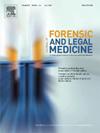暂缓起诉对物质使用障碍个体心理健康的影响
IF 1.2
4区 医学
Q3 MEDICINE, LEGAL
引用次数: 0
摘要
延迟起诉治疗是对物质使用障碍(SUDs)患者的一种法律限制性替代监禁。本研究考察了治疗的有效性,以及接受延期起诉的个体的心理结果。我们通过回顾他们三年的治疗记录来评估延迟起诉的sud患者。结果测量和预测因素通过治疗前和治疗后的心理评估进行评估。统计分析包括皮尔逊卡方检验、独立t检验、广义估计方程(GEEs)和描述性统计来分析延迟起诉的预测效果。治疗后药物滥用筛选试验(DAST)、贝克抑郁量表(BDI)和贝克焦虑量表(BAI)得分均显著降低,但自我效能感无显著变化。DAST得分高的预测因素包括撤销延期起诉、尿检阳性、高等教育程度和监禁史。GEE结果显示,被撤销延期起诉者的自我效能较低。此外,合并症预示着更高的BDI和BAI评分。推迟起诉治疗可以减少药物使用并改善心理结果,特别是在提供结构性支持的情况下。针对法律和医疗挑战量身定制的干预措施可以促进sud患者的康复,研究结果可以为法律和保健战略提供信息,为sud患者提供益处。本文章由计算机程序翻译,如有差异,请以英文原文为准。
Effects of deferred prosecution on psychological well-being in individuals with substance use disorders
Deferred prosecution treatment is a legally restrictive alternative to incarceration for individuals with substance use disorders (SUDs). The present study examined efficacy of treatment, and psychological outcomes in individuals undergoing deferred prosecution. We evaluated patients with SUDs under deferred prosecution by retrospectively reviewing their treatment records over three years. Outcome measures and predictors were assessed through pre- and posttreatment psychological evaluations. Statistical analyses included Pearson's chi-squared test, independent t-test, generalized estimating equations (GEEs), and descriptive statistics to analyze the predictive effects of deferred prosecution. Significant reductions were observed in Drug Abuse Screening Test (DAST), Beck Depression Inventory (BDI), and Beck Anxiety Inventory (BAI) scores post-treatment, but no significant changes in self-efficacy. Predictors of high DAST scores included revoked deferred prosecution, positive urinalysis, higher education, and incarceration history. GEE results showed lower self-efficacy among those with revoked deferred prosecution. Additionally, comorbid medical conditions predicted higher BDI and BAI scores. Deferred prosecution treatment can reduce substance use and improve psychological outcomes, particularly when structured support is provided. Tailoring interventions to address legal and medical challenges can enhance the recovery of patients with SUDs, and the study results can inform legal and health-care strategies, providing benefits for individuals with SUDs.
求助全文
通过发布文献求助,成功后即可免费获取论文全文。
去求助
来源期刊

Journal of forensic and legal medicine
MEDICINE, LEGAL-
CiteScore
2.70
自引率
6.70%
发文量
106
审稿时长
57 days
期刊介绍:
The Journal of Forensic and Legal Medicine publishes topical articles on aspects of forensic and legal medicine. Specifically the Journal supports research that explores the medical principles of care and forensic assessment of individuals, whether adult or child, in contact with the judicial system. It is a fully peer-review hybrid journal with a broad international perspective.
The Journal accepts submissions of original research, review articles, and pertinent case studies, editorials, and commentaries in relevant areas of Forensic and Legal Medicine, Context of Practice, and Education and Training.
The Journal adheres to strict publication ethical guidelines, and actively supports a culture of inclusive and representative publication.
 求助内容:
求助内容: 应助结果提醒方式:
应助结果提醒方式:


